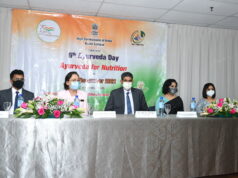 New Delhi, November 18 – There are many factors that can lead to obesity (accumulation of excess body fat), but in most cases the medical condition develops due to a mix of unhealthy eating pattern and lack of physical activity.
New Delhi, November 18 – There are many factors that can lead to obesity (accumulation of excess body fat), but in most cases the medical condition develops due to a mix of unhealthy eating pattern and lack of physical activity.
The solution is quite simple – a complete reversal of these two lifestyle habits. “Multiple factors lead to obesity. Of course, the modifiable factors are unhealthy eating (high carbohydrate and fat diets) and lack of physical exercise.
But sometimes, obesity is difficult to treat even with a healthy diet and exercise as patients may have a tendency to gain weight because of slow basal metabolic rate or genetic factors,” says Dr. Vikas Singhal, Executive Consultant, Gastro Intestinal & Bariatric Surgery, Jaypee Hospital, Noida.
It is here that a doctor of his specialisation comes into the picture. In case exercise and diet fail to produce results or the person has an extreme case of obesity, the stomach or the small intestines are operated upon to reduce the intake of food.
This is known as bariatric or weight loss surgery. The necessity of these weight loss strategies stems from the fact that if not corrected in time, an extreme level of weight gain may lead to several severe medical conditions, or even a reduced life expectancy.
COMPLICATIONS:
“A wide range of complications arise in an obese person,” says Dr. Rakesh Durkhure, Consultant, Bariartric Surgery, Paras Hospitals, Gurgaon, “Psychologically, they are likely to be depressed and have a tendency to stay aloof.
They cannot sleep properly throughout the night as their breathing stops sometimes (sleep apnoea). Snoring is another problem.” “If you’re obese, you’re more likely to develop a number of potentially serious health problems, including: Type 2 diabetes, high blood pressure, high cholesterol, heart disease, certain types of cancer, breathing disorders, gallbladder disease, osteoarthritis and skin conditions,”
 adds Dr. Anshuman Kaushal, Consultant Bariatric Surgery, Columbia Asia Hospital, Gurgaon. As for the gynaecological problems, Dr. Shobha Gupta, Medical Director, Gynecologist and IVF Expert from Mother’s Lap IVF Centre, says: “I see at least 10 patients a day with infertility problems, out of which 3 to 4 per cent are obese.
adds Dr. Anshuman Kaushal, Consultant Bariatric Surgery, Columbia Asia Hospital, Gurgaon. As for the gynaecological problems, Dr. Shobha Gupta, Medical Director, Gynecologist and IVF Expert from Mother’s Lap IVF Centre, says: “I see at least 10 patients a day with infertility problems, out of which 3 to 4 per cent are obese.
Women who are obese are also at a greater risk for pregnancy complications like having a C-section, giving birth to a large baby or even developing gestational diabetes and hypertension.”
BODY MASS INDEX:
Seeing the numerous complications obesity can lead to, the Body Mass Index (BMI) is employed to distinguish between those who are within a healthy weight limit, those who are overweight and those who are obese. The index is calculated by dividing the weight in kilogrammes by the square of an individual’s height in meters.
In Western countries, people are considered obese when their BMI exceeds 30 kg/m2 and overweight if BMI is in the range 25-30 kg/m2. “With Asians being prone to abdominal obesity, the problems arising from obesity are further compounded.
Body composition analyses have revealed that we also have a higher body-fat ratio, which means that at the same weight compared to a Westener, we are more like to have a higher amount of body” says Dr. Singhal.
Dr. Kaushal confirms, “India is gaining weight. Traditionally known for malnutrition, Indians now report more and more frequently with overweight, obesity, and their consequences, with morbid obesity (the extreme case) affecting 5 per cent of the country’s population.
 It is mainly due to marked shift in lifestyle caused by economic growth, affluence, urbanisation and dietary westernisation. Studies have shown that for a given BMI, Indians generally have a higher percentage of body fat and abdominal obesity than those living in the West.
It is mainly due to marked shift in lifestyle caused by economic growth, affluence, urbanisation and dietary westernisation. Studies have shown that for a given BMI, Indians generally have a higher percentage of body fat and abdominal obesity than those living in the West.
Indians have also been shown to have elevated risks of Type 2 diabetes, hypertension, and hyperlipidemia at a relatively low level of BMI.” Among the states, obesity is especially on the rise in cities like Delhi, Kerala and Punjab.
Vandana Luthra, founder of VLCC, explains: “It can be attributed largely to the lifestyle and dietary patterns being followed in these states. According to National Family Health Survey (NFHS-3) India in 2005-06, obesity among women is highest in Punjab (9 per cent), followed by Delhi (8 per cent).
More than 25 per cent of women in Punjab, Kerala and Delhi are overweight or obese. Tamil Nadu and Goa also have a high percentage of women obesity (over 20 per cent).”
LEADING CAUSES:
Luthra further adds, “Sedentary lifestyles, late nights, high intake of calorie-rich fast foods and poor eating habits that include eating late, coupled with a growing gadget addiction, which has led to a lack of physical activity, are the main reasons leading to obesity.
While people in Delhi and Punjab have a diet rich in ghee, butter, paranthas, etc, Kerala is riceheavy. All these factors have led to significant increase in BMI as well as abdominal obesity.”
For people looking for tips to lose weight, especially those living in the three ‘danger’ states, Luthra advises to look no further and log on to orangepledge. com. The site presents 21 nutrition and fitness tips to lose weight and be healthier.
-INDIA TODAY










